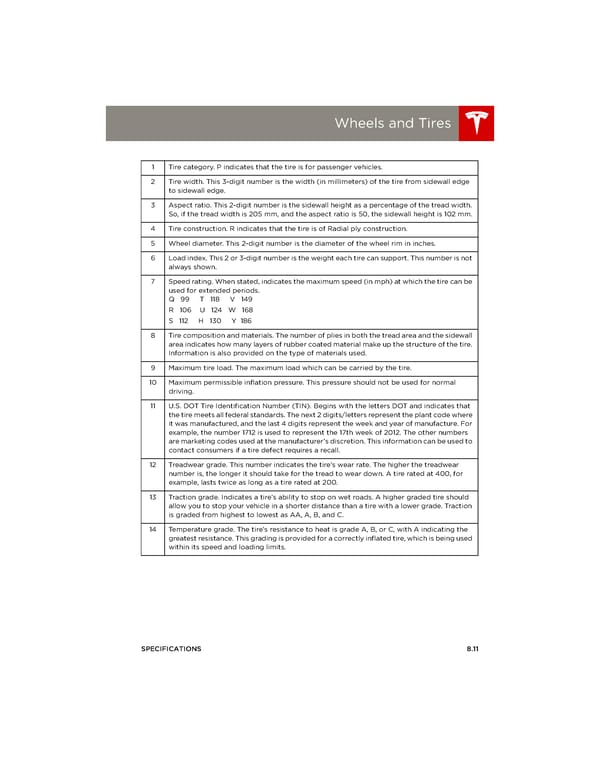book.book Page 11 Friday, July 19, 2013 12:53 PM Wheels and Tires 1 Tire category. P indicates that the tire is for passenger vehicles. 2 Tire width. This 3-digit number is the width (in millimeters) of the tire from sidewall edge to sidewall edge. 3 Aspect ratio. This 2-digit number is the sidewall height as a percentage of the tread width. So, if the tread width is 205 mm, and the aspect ratio is 50, the sidewall height is 102 mm. 4 Tire construction. R indicates that the tire is of Radial ply construction. 5 Wheel diameter. This 2-digit number is the diameter of the wheel rim in inches. 6 Load index. This 2 or 3-digit number is the weight each tire can support. This number is not always shown. 7 Speed rating. When stated, indicates the maximum speed (in mph) at which the tire can be used for extended periods. Q 99 T 118 V 149 R106U124W168 S112 H130 Y186 8 Tire composition and materials. The number of plies in both the tread area and the sidewall area indicates how many layers of rubber coated material make up the structure of the tire. Information is also provided on the type of materials used. 9 Maximum tire load. The maximum load which can be carried by the tire. 10 Maximum permissible inflation pressure. This pressure should not be used for normal driving. 11 U.S. DOT Tire Identification Number (TIN). Begins with the letters DOT and indicates that the tire meets all federal standards. The next 2 digits/letters represent the plant code where it was manufactured, and the last 4 digits represent the week and year of manufacture. For example, the number 1712 is used to represent the 17th week of 2012. The other numbers are marketing codes used at the manufacturer’s discretion. This information can be used to contact consumers if a tire defect requires a recall. 12 Treadwear grade. This number indicates the tire’s wear rate. The higher the treadwear number is, the longer it should take for the tread to wear down. A tire rated at 400, for example, lasts twice as long as a tire rated at 200. 13 Traction grade. Indicates a tire’s ability to stop on wet roads. A higher graded tire should allow you to stop your vehicle in a shorter distance than a tire with a lower grade. Traction is graded from highest to lowest as AA, A, B, and C. 14 Temperature grade. The tire’s resistance to heat is grade A, B, or C, with A indicating the greatest resistance. This grading is provided for a correctly inflated tire, which is being used within its speed and loading limits. SPECIFICATIONS 8.11
 Tesla Model S | Owner's Manual Page 132 Page 134
Tesla Model S | Owner's Manual Page 132 Page 134